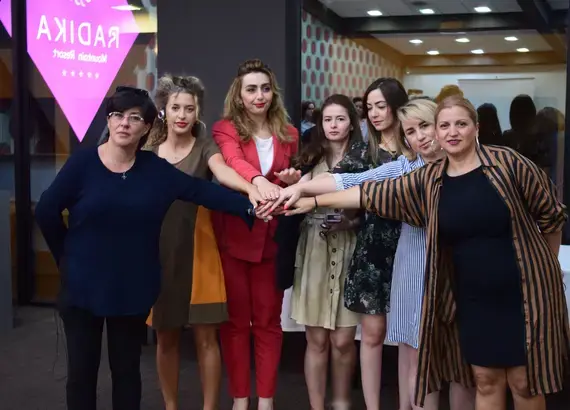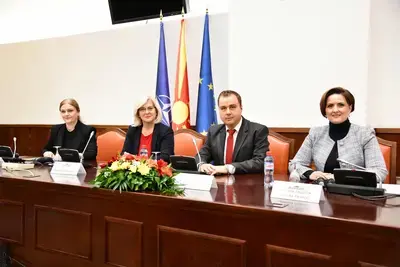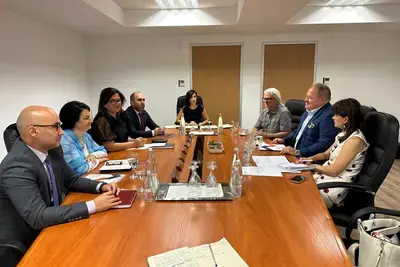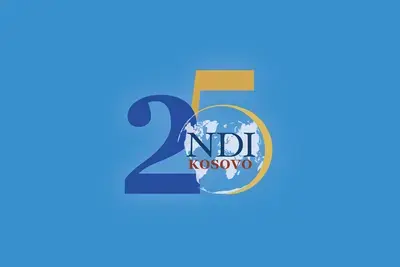
Women at the Women Leadership Academy 2019 where they attend different sessions on advocacy, communication skills and the importance of digital age for their efforts.
Success Story
Confronting the Past as a Process for National Healing and Reconciliation in Kosovo
The passing of the 20th anniversary of the Kosovo conflict has provoked an outpouring of personal reflection on wartime experiences. Every night, news channels broadcast stirring images of citizens bringing flowers to grave sites and monuments, commemorating executed and disappeared family members, telling stories, and giving speeches on heroism and hardship.
For many, the tragedy of families torn apart and of personal loss is complicated by a cultural propensity to avoid facing unpleasant realities. Wartime sexual violence and other such crimes are often subject to a cultural code of silence. Male family members express anguish at their failure to protect women from the sexual violence they experienced during the war, and avoid discussing the issue today. This has only compounded the collective trauma and suffering, and complicated the pursuit of justice and reconciliation.
But now, courageous women are changing this reality by telling their stories publicly. They are changing the narrative, finding their voices in their pursuit of justice.
When a wartime survivor of sexual violence, activist Vasfije Krasniqi Goodman, addressed the Committee on Foreign Affairs of the U.S. House of Representatives, she drew significant attention from newspapers back home, with one headline reading “Kosovo War Survivors Address U.S. Congress.”
The article reads: “Vasfije was one of the first women in Kosovo to share her story of sexual violence during the conflict. She is now bringing her case to the committee to address the impunity of war crimes and human rights abuses in Kosovo.”
After keeping silent for 20 years, Vasfije Krasniqi Goodman is taking control of her trauma – no longer a victim of wartime sexual violence, but a war survivor. While victims seek sympathy, survivors seek justice. That is why Vasfije has decided to speak. Living in the U.S., she recently visited Kosovo and publicly shared her experience with sexual violence.
Former president Atifete Jahjaga is a vocal advocate for women who suffered from sexual violence during the war. Holding Vasfije’s hand as she was addressing the U.S. House of Representatives’ Committee on Foreign Affairs, Jahjaga said that courts in Serbia and Kosovo, as well as on an international level, have failed to sufficiently prioritize the prosecution of sex crimes committed during the war.
On International Women’s Day, Jahjaga urged people everywhere to “be there for the survivors and provide support during their long road of accessing justice – survivors are so much more than what happened to them.”
Why are these stories becoming public now? In the decades after the war, Kosovars focused primarily on rebuilding their lives. It seemed more important to rebuild homes, schools, and careers than to focus on justice and reconciliation. But, 20 years on, Kosovars are now feeling secure enough to meaningfully engage with the past again. This has brought about opportunities for understanding, learning, forgiveness, and above all collective healing.
National celebrations like Kosovo’s Independence Day have provided meaningful opportunities for reflection on the more painful aspects of the country’s recent history. On February 17, 2020, Kosovo celebrated twelve years since it had declared independence from Serbia. Every year, a monument is built to commemorate Kosovo’s past, its appearance and central message changing from year to year, but often emphasizing themes like freedom of speech, sovereignty, and environmental protection. The monument was first unveiled on February 17, 2008, the day Kosovo declared its independence. This year, the obelisk carried the message “Never Ending Wars Bring Oppression, Rape and Neglect” (spelling Newborn as an acrostic) and is dedicated to all the victims of sexual assault during conflict. Monuments like Newborn ensure that moments of national pride like Independence Day do not neglect to emphasize the terrible costs of war.
Although inter-ethnic tensions have stabilized, significant divides remain. Kosovo’s ethnic, religious, and linguistic diversity presents a major challenge to reconciliation, as individuals often avoid interacting with people outside of their identified communities. This lack of communication can reinforce stereotypes and the “othering” of those who are perceived as different.
NDI’s Women’s Leadership Academy trains and empowers the next generation of female leaders in Kosovo. These leaders come from a range of ethnicities and political parties and work together to identify and address common issues in their communities. For most, attending the WLA is the first opportunity they had had to work with women from different ethnic backgrounds. For some, it marked the first time that they had ever visited Pristina, or ventured north to Mitrovica. Over the course of the program and working actively across ethnic lines, participants produced a policy brief advocating for funding safehouses and for amendments to the criminal code to explicitly cover domestic violence. Alongside these efforts the Women’s Caucus of the Kosovo Assembly proposed nearly a million euros in funding to support safehouses, which was later approved in the 2019 state budget.
The women's aspirations to prevent domestic violence and provide adequate care to those affected by it reflects the commitment to taking action to confront the legacies of the past, with an emphasis on retroactive justice. “I think women are braver, more responsbile, and have different battles to fight against discrimination of any kind,” said one of the women participant from the Serbain community, while scrolling through her phone to display a conversation she was just having with an Albanian woman, who also participates in her WLA group “Language is the only obstacle for me and her to work together, but we are working on that as well,” she added.
NDI’s emphasis on empowering underrepresented groups and pursuing reconciliation across religious, ethnic, and linguistic lines is thus crucial to developing Kosovo’s democracy and resolving its tensions with Serbia. Helping Kosovars overcome the collective trauma of wartime experiences is crucial to its broader agenda to promote democracy and stability in Kosovo and the region



